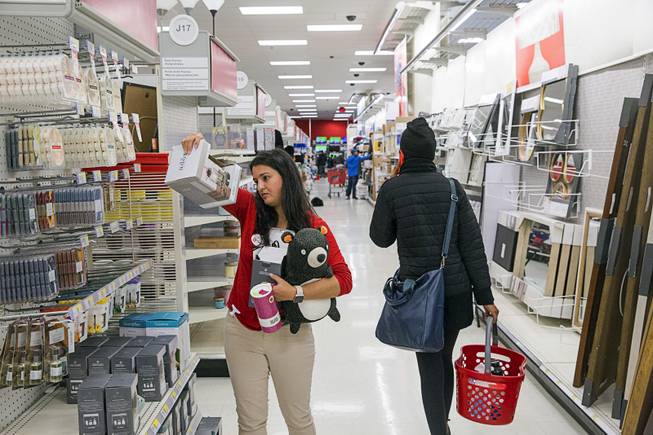
Mark Abramson / The New York Times
Melanie Colon, who spent 14 years as a stay-at-home mother, at her temporary job at a Target store in New York, Nov. 19, 2017. Holiday hiring provides an annual jolt to the economy, boosting the incomes of hundreds of thousands of families at Christmas time and providing people like Colon a chance to re-enter the labor force, even if only for a few months.
Friday, Nov. 24, 2017 | 2 a.m.
After 14 years of staying home to raise her family, Melanie Colon landed a job for the holidays at a Target store in Queens, New York, selling toys, bedsheets and linens. She hopes it will lead to a full-time position.
“For me, it’s about getting back into the workforce,” she said.
Colon, 36, is part of an army of temporary retail workers who are hired every year to help with the holiday shopping crush.
Holiday hiring gives the economy an annual jolt, raising the incomes of hundreds of thousands of families at Christmastime and offering people like Colon a chance to make some income, even if only for a few months.
But like so much about the retail industry, holiday hiring is in flux, even as stores are poised for a big shopping season. While some large retailers like Target are making a big push, others are hiring fewer temporary workers — or almost none at all.
Walmart, the nation’s largest retailer and private employer has no plans for a hiring spree this holiday season. Instead, the company said it was giving “millions more” hours to its thousands of part-time employees, many of whom rely on Walmart as their only job.
Across the country, retailers are expected to hire from 500,000 to 550,000 seasonal workers this holiday, down from the roughly 575,000 who were hired last year, according to the National Retail Federation.
The decline reflects the forces buffeting the retail industry and the broader economy.
With more sales moving to the internet, many brick-and-mortar stores are seeing less foot traffic, which means they need fewer workers manning the aisles. Retailers are also on pace to close thousands of stores this year.
“The industry is going through a transformation,” said Jack Kleinhenz, chief economist at the National Retail Federation.
The sharp decline in the unemployment rate in recent years has created a tight job market, so fewer Americans need temporary work. With profits under pressure, the last thing that retailers want to do is to get into a bidding war for workers by substantially raising wages.
The shifts are evident at Macy’s. The retailer is synonymous with the holiday season, but there is little to cheer about on 34th Street this year.
Macy’s plans to close about 100 stores and its sales have declined for 11 consecutive quarters. This year the company said it would hire around 80,000 seasonal workers, about 4 percent fewer than last year.
Nearly a quarter of those temporary workers, about 18,000, will be working in fulfillment centers across the country, in places like Goodyear, Arizona, and Martinsburg, West Virginia.
Macy’s is trying to stem the flow of sales to Amazon by pushing an “omni-channel” strategy meant to be all things to all shoppers: a helpful and engaging shopping experience in stores, an alluring website and quick home delivery.
It is a tall order that requires big investments. And, as if sensing weakness, Amazon is ratcheting up the pressure.
The online-retail giant is hiring 120,000 seasonal workers, many of whom will pick, pack and ship boxes this Christmas. That is on top of the roughly 50,000 permanent workers it added at its fulfillment centers this fall.
Conditions suggest that this will be a robust shopping season. Unemployment is low, consumer confidence is high and the stock market has been booming.
As a result, holiday sales are projected to increase by as much as 4 percent from a year ago, to $682 billion, according to the National Retail Federation.
“This is as good as it gets,” said Mark Zandi, chief economist at Moody’s Analytics. “If they can’t survive in this environment it is hard to imagine they will be around for very long.”
Holiday hiring will be an important factor for retailers trying to impress, or, in some cases, win back shoppers.
Bringing on too few workers could produce disheveled shelves and long lines — and sour shoppers even further on brick-and-mortar stores.
Executives at Walmart said the decision to forgo adding thousands of seasonal workers was made partly because so many store employees, including those working part time, having been trained in how to navigate new technologies, like hand-held devices for pricing goods and tracking inventory. Training temporary workers on these systems, only to let them go after a few months, would be inefficient.
“This is the same approach we took last year, and we heard great feedback from our customers and associates,” Walmart’s chief operating officer, Judith McKenna, said in a statement.
Among large retailers, Target is making perhaps the biggest holiday hiring splash.
The company plans to hire 100,000 seasonal workers, up from 70,000 last year, as it makes a push to improve the shopping experience in its stores and grab market share from some of its struggling rivals.
In addition to hiring so many seasonal workers, the company said it was raising its starting wage to at least $11 an hour.
Colon, the seasonal worker at the Target in Queens, said she saw an ad seeking holiday help on the retailer’s website. Personally, she does much of her shopping online, but she thinks the stores are important.
“I have people come in and say ‘I am buying this for my sister or I am buying this for my girlfriend'” she said. “They want my opinion. You don’t get that online.”
